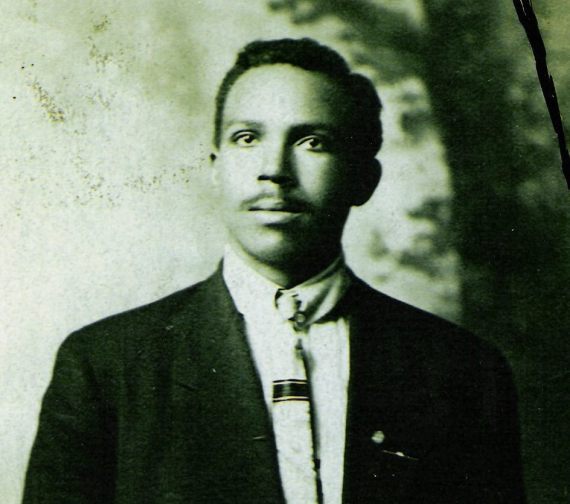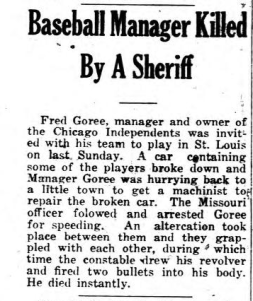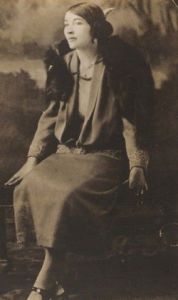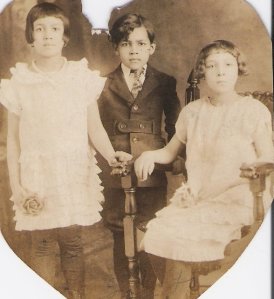Fred Gorée, owner and manager of the Chicago Independents
I wanted to do something different, before I continue to further explore West Coast African American baseball for the uninitiated.
During my research of West Coast leagues and teams during the early years of the 1900’s through 1940’s, I happened to run across an article that brought to mind the question of “why some African American West Coast players and teams chose to stay in the West…as opposed to head East to play in the pros?”. This question, being continually asked about that time period, is simple enough for some, and still difficult for others to understand. Which brings to mind the question, are researchers of this type of material being brutally honest with themselves about the time period they are researching?
I’ve run across articles that explain the social dynamics of the Jim Crow period, when African American baseball collided with the forces of overt racism, and this is what has helped me stay realistic about the research I’m engaged in. I try my best to remain neutral within the scope of discovering information that might be either helpful or informative to those that need it. I came across an article about a African American baseball manager and owner named Fred Gorée. His first name depends on whose doing the research. So is the spelling of his last name. He owned and managed of the Chicago Independents, a barnstorming team out of Illinois. I’m signed up for the Research Committee for SABR, but because I write other things beyond this blog about other important historical events, it’s hard for me to dedicate a specific amount of time, or even begin to immerse myself with these very dedicated projects, like the Negro League Baseball Grave Marker Project.
That doesn’t mean I don’t think it’s not a worthwhile project.
I truly believe it is worthwhile.
Some baseball journalists, such as Ryan Whirty, are really active participants in the Negro League Baseball Grave Marker Project. It was started by Dr. Jeremy Krock of Illinois. Ryan writes a wonderful blog called, The Negro Leagues Up Close, and he is deeply involved in the grave marker project. It’s not easy locating unmarked graves of some of the nation’s greatest, forgotten, baseball players. Those who received little recognition in their life for playing the greatest game that was ever invented, and may never be remembered in their deaths, unless their grave are marked in remembrance. The fact remains, a lot of these players, and where they may have been buried, may be never found based on the America’s history of Jim Crow. Which brings me to the subject of deep exploration in African American baseball research, and how we’ll go to find out certain details about events that took place in America’s history.
When I read the story about Theodore Roosevelt “Terrible Ted” Page, whose ashes rested in an unmarked community vault in Alleghany Cemetery in Lawrenceville, I was moved. Page, who had played for the Pittsburgh Crawfords and Homestead Grays made his mark in the world of baseball, but had been forgotten in death. Which brought me to this article I found recently while research West Coast African American baseball.
California Eagle, August 14, 1925
The blogger of “oldplatesandoldpeople“, Jewell Lorenz Dunn, who specializes in genealogy and finding out information about families posted a blog about “Frank Goree”, who was actually named Fred Gorée, and how she’d found information pertaining to “census records, marriage records, city directories, and the social security death index“, which is outstanding. This happened back in 2011. My concern is this though. The circumstances under which Mr. Gorée died are evident from the article you see here. One could possibly surmise from reading it, that after he was murdered, his team–fearing for their own lives–fled the scene and the town immediately, leaving Mr. Gorée behind. Having no way to get him back home, his body may still be in an unmarked grave, somewhere in Missouri.
Luckily that wasn’t the situation.
Mr. Fred Gorée is located at Lincoln Cemetery in Alsip, Illinois.
My other concern is about making sure we’re giving pause for greatness, when the story is unknown or untold.
Here’s the short version.
Fred Gorée was a bricklayer by trade. He also was the owner and manager of a minor league African American baseball team called the Chicago Independents. See, Fred Gorée’s brand new Buick had broken down. He was in East St. Louis at the time, trying to make good on a by “invitation” scheduled event in St. Louis. His car had broken down, and when he went to find help to get his car repaired, he was falsely accused of stealing a “brand new automobile”, because basically–during the period of Jim Crow in America, a black man couldn’t have possibly been able to afford a new car, based on his skin color alone. Obviously, he must have stolen it, and he was summarily executed by the side of the road, by a Sheriff and his deputies in East St. Louis, while his team mates were held at bay and made to watch him die. They decided to have a lynching party, according to his daughter, Eselean Gorée. She never forgot how her father was shot, and then beaten to death to finish him off, for being “uppity” enough to tell the truth about owning a new car.
He was survived by a wife and three children.
Mrs. Sara Beff May Gorée
Eselean, Clarence and LoEsther Gorée
Five years later in 1930, these three children lost their mother, Sara Beff May Gorée, to tuberculosis.
Eselean Gorée (Henderson) went on to graduate from George Williams College in Hyde Park, where she earned a degree in Physical Education, while she studied dance, sculpture and drawing. She taught Physical Education in the public school system in Chicago for many years. After retiring from teaching, she studied at the Art Institute of Chicago. She became a very famous pottery artist known as the “Clay Lady”. Mrs Eselean Gorée Henderson artwork has been displayed at the Art Institute, the DuSable Museum, the Krannert Museum at the University of Illinois at Urbana-Champaign and the State Museum in Springfield.
The Gorée Family was originally from Ruston, Louisiana, and moved to Chicago during the Great Migration. Like many African American families from the South, they moved North to seek better opportunities for their families, especially the children. The accented (é) in Fred Gorée’s last name is connected to his Creole heritage and it’s something that will have to be considered when his graver marker is finally secured.





Thanks for this post. I created the FB page for my mom, Eselean Goree Henderson. I want others to know about her, her talent, family and a little about her life’s accomplishments against profound odds. She inspires our family, and her story may inspire others.
LikeLiked by 1 person
I omitted that I am glad you found the FB page to create this blog post. i thank Dr. Krock for his work and for sharing news of your blog.
LikeLiked by 1 person
This is my great grandfather, thank you for the article
LikeLiked by 1 person
Thanks for sharing, Fred Goree was my Great Grandfather too!
LikeLiked by 1 person
Thanks for the article! My husband is named Fred Goree after his grandfather. His father was Clarence Goree and he is seeking more information about the details centered around his grandfather’s death. He is hoping to connect with others that can help him find out more. Such as newspaper articles, police records (if such exists) etc.
LikeLiked by 1 person
Fred Goree is my Great Grandfather, also! LoEsther is my Grandmother. Thank you for all your hard work in filling in the pieces about my family legend/ history.
LikeLiked by 1 person
Thanks for the article this is my great grandfather
LikeLiked by 1 person
He was my great grandfather too, and I had no idea! I am honored to be a descendant of the Goree Family. Thank you so much for sharing this inspiring story.
LikeLiked by 1 person
my mother told Us many years ago about how my grandfather died but I never knew how mean and evil people could be, so I basically took it for granted but now I knew how wrong I was.l’m sure this tragic event had a profound effect on the lives of us all.. he was a good man and a grandfather.. I never got the chance to know or love or know him.. My Mother grew up without a Father to love and it has affected us all. May my grandfather rest in peace and may the Goree families finally have closure knowing the truth
Richard Augustine
Son to LoEster Goree and grandson of Fred Goree
LikeLike
Fred was my grand uncle. His sister Rebbie was my grandmother. I heard this story over and over from her and my father Bartell A Williams. Great to see it in writing. Simsboro, LA is where I was always told we were from. Ruston must not be far away. A trip there is a must!
Who wrote this?
LikeLiked by 1 person
Me. I’m glad that you liked it.
LikeLike
Bartell
The source of some of this blog is the FB page I created for mom. You’ll see these photos there. Many family have shared the photos. Mr Auther wrote the blog, but several, including me, have provided source info. I thank him for his work and for publishing it here.
Roz
LikeLiked by 1 person
Pls notice my name ends in ‘a’ and not z ……
LikeLiked by 1 person
Fred Goree was my grandfather. He was my mother LoEsther Goree Augustine’s father. I heard many versions of my grandfathers murder by the police. I am glad to get the details about his death and know that the Grave Markers Project has honored my grandfather by telling the story about his death and marking a grave site for Fred. I would like to offer my support to the project. Please inform me of how I may do this. My e mail is elmorej@pacbell.net. Thank you.
LikeLiked by 1 person
This is wonderful hearing from so many of our family members. Fred Goree was my grandfather also. My mother was Eselean Goree Henderson, Fred Goree’s middle child. (Sister of Rosalind Henderson Mustafa and Jennifer Beth Henderson) I am also reaching out to historians and others to find additional information for our records.
LikeLiked by 1 person
Thanks for sharing this article Fred Goree was my great grandfather
LikeLiked by 1 person
Pingback: Up next for the NLBGMP: Waxey Williams | The Negro Leagues Up Close
From the Chicago Tribune, which misspelled Mr. Goree’s name.
Aug 2, 1925: St. Louis, MO. (AP) Fred Foree, NEgo, 35, manager of a Chicago Negro baseball team schedeled to play a St. Charles, Mo. team today, was shot to death late last night by a Deputy Constable of St. Louis County, after a hand-to-hand struggle for a officer’s revolver.
The struggle followed a heated controversy between the two men when the officer arrested Foree and two negro companions for speeding forty-eight miles an hour on the St. Charles road near here.
Foree had refused to submit to arrest.
LikeLiked by 1 person
ThankThanks for sharing the post of my great grandfather
LikeLiked by 1 person
Pingback: Self-defense or whitewashed lynching? | The Negro Leagues Up Close
Pingback: The grave marking effort soldiers onward | The Negro Leagues Up Close